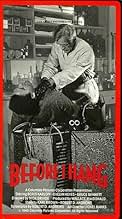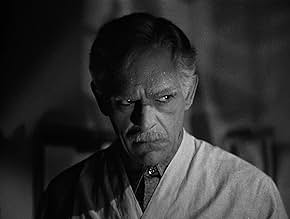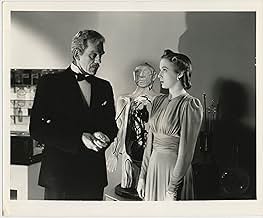IMDb RATING
6.1/10
1.6K
YOUR RATING
A physician on death row for a mercy killing is allowed to experiment on a serum using a criminals' blood, but secretly tests it on himself. He gets a pardon, but finds out he's become a Jek... Read allA physician on death row for a mercy killing is allowed to experiment on a serum using a criminals' blood, but secretly tests it on himself. He gets a pardon, but finds out he's become a Jekyll-&-Hyde.A physician on death row for a mercy killing is allowed to experiment on a serum using a criminals' blood, but secretly tests it on himself. He gets a pardon, but finds out he's become a Jekyll-&-Hyde.
Ernie Adams
- Sam - Hospital Prison Orderly
- (uncredited)
Stanley Brown
- Prison Gate Guard
- (uncredited)
Frederick Burton
- Governor Prentiss
- (uncredited)
Jack Cheatham
- Patrolman Olson
- (uncredited)
Edward Earle
- Dr. Nichols
- (uncredited)
Richard Fiske
- Mandish
- (uncredited)
Featured reviews
Boris Karloff would begin to repeat what might be considered the same part again and again in a series of "Mad Doctor" films he made for Columbia Pictures in the early '40s. As the elderly Dr. Garth, Boris is developing a serum which he hopes may preserve life. He's been convicted of the mercy killing of a terminally sick friend (would that make Karloff the first Dr. Jack Kevorkian?) but yet is allowed to continue his experiments while on death row with the aid of prison physician Dr. Miller (DRACULA's Edward Van Sloan). Garth decides to use himself as a guinea pig and injects himself with a serum made with the blood of a known murderer. The kindly doctor is subsequently pardoned from his crime, and the end result of his experiment produces the amazing effect of turning him into a much younger man. He has now inadvertently reversed the aging process, but the tainted formula has one slight side effect: it periodically turns him into a homicidal killer who is seized with the urge to strangle his victims. BEFORE I HANG is a decent offering in this series, though is not to be confused with the similarly-titled and superior THE MAN THEY COULD NOT HANG from 1939. **1/2 out of ****
The third Boris Karloff "mad doctor" film is an interesting if surprisingly rather dull affair; the star is always worth watching, however, and his role here certainly offers him plenty to sink his teeth into: he starts the film as an old man about to be hanged for a mercy killing, is then rejuvenated through a serum he develops while in prison (the kindly warden having consented to Karloff continuing his experiments there until the time of his execution comes) and finally turns into a strangler (the unfortunate side-effect of the drug which contained the blood cells of a murderer)!
Though the supporting cast features several familiar faces, they're all somewhat underused: Evelyn Keyes and Bruce Bennett are certainly among the higher-prolife actors to fill the 'romantic interest' roles in this type of film, but they're just about the most thankless I've ever seen (especially Bennett who has barely 5 minutes of screen time)! Edward van Sloan's presence was especially welcome (having memorably faced-off with Karloff twice before) but, again, his prison doctor here is nowhere near as juicy as his iconic roles in Dracula (1931), FRANKENSTEIN (1931), THE MUMMY (1932) and DRACULA'S DAUGHTER (1936)! Pedro de Cordoba, on the other hand, is quite poignant as Karloff's pianist friend whose career is fading due to his advancing age; of course, Boris is willing to help him out in this regard, but his new-found and uncontrollable murderous instincts prevail! A measure of amusement is also gleaned from noticing the recurring presence of such actors as Roger Pryor, Don Beddoe and Charles Trowbridge in roles which were pretty much reprises of ones they had played in the earlier Columbia Karloffs!
On the debit side, the low budget especially shows here in the film's rather dismal sets - the other three of Karloff's serious horror efforts for Columbia made good use of the star's gadget-filled house (THE MAN THEY COULD NOT HANG [1939]), frozen underground lab (THE MAN WITH NINE LIVES [1940]) and Karloff's imposing cliff-top mansion (THE DEVIL COMMANDS [1941]); besides, the rather clinical experiments become repetitive and the film talky, which is further exacerbated by the regrettable fact that throughout there are few action/horror highlights per se.
As far as the film's DVD presentation goes, I found it to be disappointingly lackluster: while the print itself is adequate, there are no scene selections for any of the films in this set (which also proves to be the case with Universal's Karloff collection and the "Inner Sanctum" Set!) nor, for that matter, proper menu screens - have the studios become stingy or what?!
Though the supporting cast features several familiar faces, they're all somewhat underused: Evelyn Keyes and Bruce Bennett are certainly among the higher-prolife actors to fill the 'romantic interest' roles in this type of film, but they're just about the most thankless I've ever seen (especially Bennett who has barely 5 minutes of screen time)! Edward van Sloan's presence was especially welcome (having memorably faced-off with Karloff twice before) but, again, his prison doctor here is nowhere near as juicy as his iconic roles in Dracula (1931), FRANKENSTEIN (1931), THE MUMMY (1932) and DRACULA'S DAUGHTER (1936)! Pedro de Cordoba, on the other hand, is quite poignant as Karloff's pianist friend whose career is fading due to his advancing age; of course, Boris is willing to help him out in this regard, but his new-found and uncontrollable murderous instincts prevail! A measure of amusement is also gleaned from noticing the recurring presence of such actors as Roger Pryor, Don Beddoe and Charles Trowbridge in roles which were pretty much reprises of ones they had played in the earlier Columbia Karloffs!
On the debit side, the low budget especially shows here in the film's rather dismal sets - the other three of Karloff's serious horror efforts for Columbia made good use of the star's gadget-filled house (THE MAN THEY COULD NOT HANG [1939]), frozen underground lab (THE MAN WITH NINE LIVES [1940]) and Karloff's imposing cliff-top mansion (THE DEVIL COMMANDS [1941]); besides, the rather clinical experiments become repetitive and the film talky, which is further exacerbated by the regrettable fact that throughout there are few action/horror highlights per se.
As far as the film's DVD presentation goes, I found it to be disappointingly lackluster: while the print itself is adequate, there are no scene selections for any of the films in this set (which also proves to be the case with Universal's Karloff collection and the "Inner Sanctum" Set!) nor, for that matter, proper menu screens - have the studios become stingy or what?!
I am not exactly a connoisseur of Karloff, but this film makes me want to find out more about the great master--his performance in this was truly endearing, not to mention gripping.
Furthermore, this movie should be be required viewing for modern film-makers, because it really is a masterpiece of succinctness. Not a single frame of film is wasted! The movie only lasts for 62 minutes (although I'm sure the version I saw, early one morning, lasted a good ten minutes less than that!) and yet it crams more plot into that small timescale than a great many drawn-out 3 hour epics! And yet, the real genius of the work is that it does not for a single moment seem *rushed*. Everything flows smoothly right up to the final curtain, and you are left with the feeling of having watched a "full-length" feature--a truly astonishing achievement! I glanced at my watch at about the halfway stage , not out of impatience, but out of sheer wonder at how on earth everything was going to be wrapped up to a neat conclusion within only 25 minutes or so!
This film, more than any other that I can recall, bridges the gap between the frenetic single-reeler comedies of the 20s (which crammed a hell of a lot in, at the expense of a more welcome relaxed pace), and the modern day feature. If there really was five full minutes of piano-playing in this, I can't say that it perturbed me in any way whatsoever--it merely helped to set the melancholy mood of the piece. And that five minutes of a one hour film can be dedicated solely to mood setting, without generating any feeling of slow-down, is something really quite remarkable.
A great genius *can* make a 4 hour film work... but such directors are *extremely* few and far between (e.g. Kurosawa, von Stroheim). All others should learn from the director of this work: the Occam's Razor of feature films.
Furthermore, this movie should be be required viewing for modern film-makers, because it really is a masterpiece of succinctness. Not a single frame of film is wasted! The movie only lasts for 62 minutes (although I'm sure the version I saw, early one morning, lasted a good ten minutes less than that!) and yet it crams more plot into that small timescale than a great many drawn-out 3 hour epics! And yet, the real genius of the work is that it does not for a single moment seem *rushed*. Everything flows smoothly right up to the final curtain, and you are left with the feeling of having watched a "full-length" feature--a truly astonishing achievement! I glanced at my watch at about the halfway stage , not out of impatience, but out of sheer wonder at how on earth everything was going to be wrapped up to a neat conclusion within only 25 minutes or so!
This film, more than any other that I can recall, bridges the gap between the frenetic single-reeler comedies of the 20s (which crammed a hell of a lot in, at the expense of a more welcome relaxed pace), and the modern day feature. If there really was five full minutes of piano-playing in this, I can't say that it perturbed me in any way whatsoever--it merely helped to set the melancholy mood of the piece. And that five minutes of a one hour film can be dedicated solely to mood setting, without generating any feeling of slow-down, is something really quite remarkable.
A great genius *can* make a 4 hour film work... but such directors are *extremely* few and far between (e.g. Kurosawa, von Stroheim). All others should learn from the director of this work: the Occam's Razor of feature films.
Dr. John Garth (Boris Karloff) is convicted of a mercy killing and sentenced to hang. With the time he has left, he is allowed to continue his experiments in prison. He creates a serum that reverses aging and tries it out on himself. But side effects of the serum turn him into a homicidal maniac. Karloff is terrific in a role very similar to many others he had played before and always perfectly. He was so good at creating sympathetic performances out of characters that other actors would have played in broad strokes. Nice supporting cast that includes the always good Edward Van Sloan, Evelyn Keyes, Bruce Bennett, Don Beddoe, and the underrated Pedro de Cordoba. You might not recognize some of those names but it's a solid cast for a 'B' picture. Not the best of Karloff's mad scientist films but highly enjoyable anyway. Definitely give it a shot.
Of the Karloff Columbia Mad Doctor pictures, my very favorite is "The Man With Nine Lives" with "The Devil Commands" a close second followed by "The Man They Could Not Hang" (which was still quite good). Similarly, "Before I Hang" is a good "B" picture with some good scenes such as the experimentation with the model in order to mix the chemicals and serums correctly. Karloff's "Dr. Jekyll - Mr. Hyde" transformations seem to be very hair-raising indeed.
As usual, Karloff proves he was one of the best mad scientists of classic shudder cinema.
This neat little "B" came with a good supporting cast including Bruce Bennett and Evelyn Keyes.
Worthwhile watching with all of your "B" buddies.
7/10.
As usual, Karloff proves he was one of the best mad scientists of classic shudder cinema.
This neat little "B" came with a good supporting cast including Bruce Bennett and Evelyn Keyes.
Worthwhile watching with all of your "B" buddies.
7/10.
Did you know
- TriviaThis film was shot in the house later used in the 1945 title Le Portrait de Dorian Gray (1945) staring Hurd Hatfield.
- GoofsWhen speaking to his older friends, Dr. Garth mentions that humanity had only been able to increase life expectancy by maybe 15 years in the past fifty years of modern science. His friends counter that human lifespan is meant to only be 70 years ("three score and ten"). Both statements are incorrect. Life expectancy in the US was more like 60 (men) and 65 (women) in 1940, up from life expectancy around 40 in 1890. However, data was spotty before 1900, and life expectancy in the early 1900s was closer to 50, which may have been more what Dr Garth was referring to, he was just hyperbolic about the time frame.
- Quotes
Dr. John Garth: Someday, somehow, medical science will find a way to end the needless, ghastly suffering caused by the ravages of age!
- ConnectionsFeatured in TJ and the All Night Theatre: Before I Hang (1979)
Details
- Release date
- Country of origin
- Language
- Also known as
- El mago de la muerte
- Production company
- See more company credits at IMDbPro
- Runtime
- 1h 2m(62 min)
- Color
- Aspect ratio
- 1.37 : 1
Contribute to this page
Suggest an edit or add missing content





























